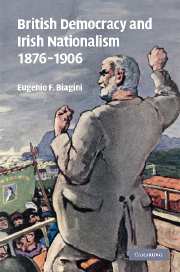Book contents
- Frontmatter
- Contents
- Acknowledgements
- Note on capitalization
- List of abbreviations
- 1 Home Rule as a ‘crisis of public conscience’
- 2 ‘That great cause of justice’: Home Rule in the context of domestic Liberal and radical politics
- 3 Constitutional Nationalism and popular liberalism in Ireland
- 4 ‘Giving stability to popular opinion’? Radicalism and the caucus in Britain and Ireland
- 5 Joseph and his brethren: the rise and fall of Radical Unionism
- 6 Social radicalism and the revival of the Gladstonian ‘popular front’
- 7 Democracy and the politics of humanitarianism
- Bibliography
- Index
5 - Joseph and his brethren: the rise and fall of Radical Unionism
Published online by Cambridge University Press: 11 July 2009
- Frontmatter
- Contents
- Acknowledgements
- Note on capitalization
- List of abbreviations
- 1 Home Rule as a ‘crisis of public conscience’
- 2 ‘That great cause of justice’: Home Rule in the context of domestic Liberal and radical politics
- 3 Constitutional Nationalism and popular liberalism in Ireland
- 4 ‘Giving stability to popular opinion’? Radicalism and the caucus in Britain and Ireland
- 5 Joseph and his brethren: the rise and fall of Radical Unionism
- 6 Social radicalism and the revival of the Gladstonian ‘popular front’
- 7 Democracy and the politics of humanitarianism
- Bibliography
- Index
Summary
[S]urely it were better to regard these islands as forming but one nation and let each man, whatever his nationality, have such share of the common inheritance as he shows himself fitted for.
The loss of Chamberlain alone was an immeasurable disaster; his influence with the democracy had for some time past exceeded Gladstone's … In any case, the energy of a Parliament created for social reform was to be spent on prolonged struggle over a subject which had formed no part of the election programme. Working men would find that their devotion had been thrown away, their confidence abused, the promised reforms to which they gave their votes postponed indefinitely, if not altogether sacrificed, to a measure of which no one among them had ever heard.
The rising hope of those stern and unbending Radicals, 1882–6
Chamberlain's 1885 pre-election tour of Scotland was a triumph. In the electoral campaign itself he ‘out-Midlothianed’ Gladstone. Although he avoided the open-air speeches at which the GOM excelled, preferring carefully stage-managed meetings in public halls, his rhetoric was ‘electrifying’ and left an indelible mark on the then rising generation of radicals such as Augustine Birrell and Lloyd George. ‘I still remember’ – wrote Ramsay MacDonald in 1914, recalling Chamberlain's speech in Glasgow of 15 September 1885 ‘as if it were but yesterday’ the thrill of pleasure which went through Radical Scotland … Its bold audacity struck the imagination of the country.'
- Type
- Chapter
- Information
- British Democracy and Irish Nationalism 1876–1906 , pp. 217 - 274Publisher: Cambridge University PressPrint publication year: 2007

